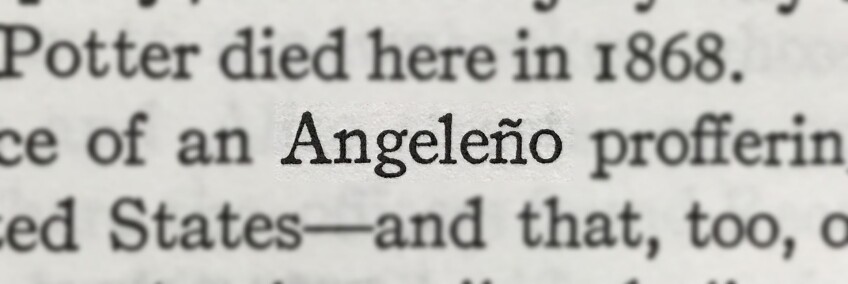Angelino, Angeleno, and Angeleño


Who are we? In a previous post, I used the Google Books Ngram Viewer to compare two of the words that have been used to name those who live in Los Angeles: Angelino and Angeleno.
There's another word, original and more correct. The word for us is Angeleño (with a tildé over the n). The sound of ñ is roughly approximated by the "ny" in canyon. In telling the Spanish alphabet, the letter ñ is pronounced "enye."
Even after the Americanization of Los Angeles (and until the early 1860s), nearly all residents of the city - Anglo and Latino both - spoke Spanish. Presumably (if it ever came up in conversation), they called themselves Angeleños, because that's the usual form of the noun.
The Oxford English Dictionary notes that the first use in print of a word denoting a resident of Los Angeles appears in California of the South, published in English in 1888. The authors of California of the South (Walter Lindley and Joseph. P. Widney) were Anglo residents of early Los Angeles writing for readers in the East. They assumed that Angeleño was the common name for Los Angeles residents.
Not Angelino or Angeleno.
The OED notes that the ending -eño continues to be the regular formation of the word describing residents of a city or a region: think of Norteño. The OED parenthetically adds that Angeleño is "also used" to name residents of Los Angeles, California.
The American Heritage Dictionary also points out that the Spanish word for the inhabitations of cities in Latin America named Los Angeles is Angeleño. (There are more than 100 towns in Latin America called Los Angeles.) Interestingly, English language newspapers in the Philippines routinely refer to residents of Los Angeles – a major city on the island of Luzon – as Angeleños.
When Ñ disappeared, we lost a little of our music along with our memory.
So how did the tildé disappear from our collective identity and the Spanish pronunciation that it represents? After the first influx of eastern and midwestern immigrants in the late 1870s, Los Angeles lost its everyday bilingualism. Ñ was one more letter to maintain in the typesetter's case of fonts when type was set by hand. And the ñ was hard to distinguish from an English n, making typographical errors a problem. The typesetters weren't familiar with Spanish orthography anyway. And we were careless Americans who had little time for the details of Spanish pronunciation.
Ñ disappeared; a sound disappeared from our common speech. We lost a little of our music along with our memory.
For years the Los Angeles Times tried to get residents and tourists to pronounce the city's name in some approximation of Spanish. It had no effect. When I was growing up in the 1950s, the city was variously Lhas ANG-less or Loss AN-jell-ease. Today, it's mostly lawss-AN-juh-luhs.
Oh . . . and the name of the city should be spelled Los Ángeles, with an accent over the a.

